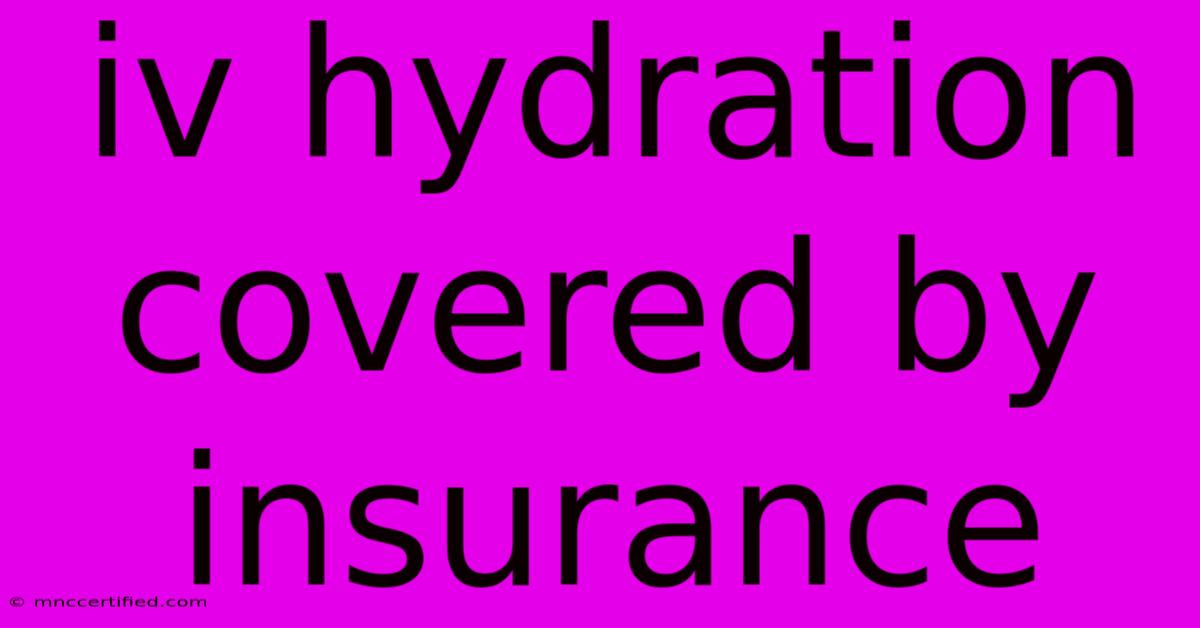Iv Hydration Covered By Insurance

Table of Contents
IV Hydration Covered by Insurance: A Comprehensive Guide
Is IV hydration covered by insurance? The short answer is: sometimes. Whether your insurance covers intravenous (IV) hydration depends on several factors, including your insurance plan, the reason for the treatment, and the provider you choose. This comprehensive guide will help you navigate the complexities of insurance coverage for IV hydration.
Understanding Your Insurance Policy
Before seeking IV hydration, thoroughly review your insurance policy. Look for details regarding:
- Covered services: Your policy should list covered medical procedures and treatments. Search for terms like "intravenous therapy," "fluid replacement," or specific conditions treated with IV hydration (e.g., dehydration).
- Network providers: Many insurance plans offer lower costs when you use in-network providers. Check if your chosen IV hydration clinic or doctor is in your insurance network. Using an out-of-network provider will likely result in higher out-of-pocket costs.
- Pre-authorization requirements: Some insurance companies require pre-authorization for certain procedures, including IV hydration, especially if it's not considered medically necessary. Contact your insurance provider to confirm if pre-authorization is needed before your treatment.
- Deductible and copay: Understand your deductible and copay amounts. You'll likely have to meet your deductible before your insurance starts covering the costs. Your copay is the fixed amount you pay per visit.
Medical Necessity: The Key Factor
The most crucial factor determining insurance coverage is medical necessity. Insurance companies are more likely to cover IV hydration if a doctor deems it medically necessary to treat an underlying condition, such as:
- Severe dehydration: Due to illness (e.g., gastroenteritis, influenza), excessive sweating, or other causes.
- Electrolyte imbalances: Conditions like hyponatremia (low sodium) or hypokalemia (low potassium) may necessitate IV hydration to restore electrolyte balance.
- Post-surgical recovery: IV fluids are often administered after surgery to help with rehydration and prevent complications.
- Certain medical conditions: Some chronic illnesses may benefit from IV hydration therapy as part of a broader treatment plan. Consult your doctor to discuss this possibility.
When IV Hydration Might Not Be Covered
Insurance companies are less likely to cover IV hydration if it's considered:
- Elective or preventative: IV hydration for wellness purposes, such as boosting energy or improving skin hydration, is typically not covered by insurance.
- Not medically necessary: If your doctor doesn't find a medical reason for IV hydration, your insurance company likely won't cover it.
- Provided by an out-of-network provider: As mentioned earlier, using an out-of-network provider significantly increases your out-of-pocket expenses.
Steps to Take Before Your Appointment:
- Contact your insurance provider: Call your insurance company to discuss your coverage for IV hydration before scheduling an appointment. Get clear answers about pre-authorization, covered services, and expected costs.
- Obtain a doctor's referral (if required): Some insurance plans require a referral from your primary care physician before approving IV hydration.
- Choose an in-network provider (if possible): This helps minimize your out-of-pocket costs.
- Keep detailed records: Keep copies of your insurance policy, doctor's referrals (if any), and all communication with your insurance company and the IV hydration provider.
Alternative Options
If your insurance doesn't cover IV hydration, explore alternative options:
- Oral rehydration: Drinking plenty of fluids (water, electrolyte drinks) is often a sufficient solution for mild dehydration.
- Negotiating payment plans: Discuss payment plans with the IV hydration clinic.
- Seeking financial assistance: Some clinics offer financial assistance programs for patients who can't afford treatment.
Conclusion
Insurance coverage for IV hydration varies significantly. Proactive communication with your insurance provider and a clear understanding of medical necessity are essential to determining your eligibility for coverage. Remember to thoroughly review your policy and seek clarification from your insurance company and healthcare provider before undergoing any IV hydration treatment. This proactive approach will help ensure a smooth and financially responsible healthcare experience.

Thank you for visiting our website wich cover about Iv Hydration Covered By Insurance. We hope the information provided has been useful to you. Feel free to contact us if you have any questions or need further assistance. See you next time and dont miss to bookmark.
Featured Posts
-
Long Term Care Insurance Arkansas
Nov 19, 2024
-
Record So Cal Thanksgiving Travel What To Expect
Nov 19, 2024
-
Insurance That Covers Liposuction
Nov 19, 2024
-
Is Otoplasty Covered By Insurance
Nov 19, 2024
-
North Korea Kims Nuclear Forces Expansion
Nov 19, 2024